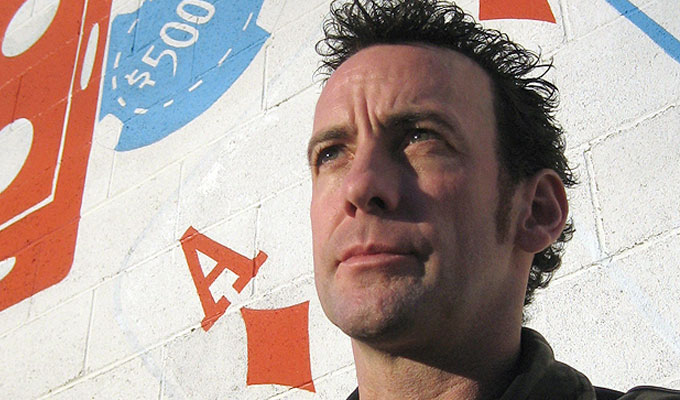Ah, the festival season: thousands of young people wasted on cheap lager or dubious drugs getting caked in mud in some remote, unhygienic field.
Or then there's Henley with its black tie dress code, Moët vending machines and sculpture garden, where items are for sale for five-figure fees. Some punters take in the ambiance from corporate marquees bedecked in elegant designer furniture; others from the lacquered wooden decks of their private boats, either moored on site or gliding silently past on the tranquil Thames.
Elitist? You bet it is. But it’s also exquisitely done.
A stage erected over the river hosts the musical headliners, but there are also other attractions, including a sizeable comedy club marquee, opened tonight with an hour-long set from Paul Zenon, whose slick magic and comically grumpy patter are an accessible appetiser for this well-heeled audience.
He takes the same approach to comedy as he does to his tricks, finely tuned and well-rehearsed, delivered with a professionalism that ignores the relatively low energy of the crowd. But the finely engineered banter also feels like it probably hasn’t changed in years. Which it hasn’t.
He’s self-deprecating but feigns passive-aggressive acceptance when the audience’s British reserve means his illusions don’t provoke the adulation he thinks they deserve. It’s mostly on the mild side, although there’s a slightly odd note with 1970s-style banter hinting at molestation as he gets female volunteers to put cards down their bras, and a later reverie in which he becomes an unhinged weirdo imagining stabbing a woman to death because the voices told him to. Too much needn’t be made of this, but it’s a train of thought an act writing relatively mainstream material today probably wouldn’t go down.
Zenon’s conjuring is impeccable, so when he sucker-punches with a gag that involves no magic, the audience are totally hoodwinked. Otherwise there are some impressive ‘appearances’ of objects, a trick explained and then subverted and a great calling-card involving a presumably very expensive dinner jacket borrowed from the audience. His ever-dependable showstopper, demonstrating the power of centrifugal force, makes people as nervous as they are impressed
Inexplicably the festival schedules its next comedy session – a triple bill club-style line-up – directly against the Pet Shop Boys who everyone has come for. As it starts, there are 23 people in a marquee that seats about 600, which makes life hard even for an experienced, upbeat compere like Kiri Pritchard McLean, performing the opening set.

‘I don’t know what to do with you guys,’ she admits, intimidated by the poshness of it all, though her field reports back from normal working-class life entertained, even if the proportion of an already small number who got her Gavin & Stacey references was disappointingly low.

Paul Foot, it’s fair to say, divided the crowd. Even though more people had drifted in by the time of his set, he drove plenty of them away again, cheerily accepting the inevitable by telling the non-believers they were right to walk out. Comedy’s subjective, Foot argued, so they’d been clever to figure out his strangeness was not for them. For his part, Foot was happier playing to those who were on board the bizarre train.
It was a nice way of binding those who stayed, and he got big laughs from his surreal brand of humour. Some of the peculiar mini-scenes he conjures up in what he calls his ‘disturbances’ are more odd than funny, although at his best they lead to discursive explanations which contain real jokes. The drink-driver-paedophile routine is a treasure, for instance.

Finally in this segment, Glenn Moore, who didn’t have much of a journey demographically speaking to get here, with his posh RP accent straight from the upmarket Sussex village of Hurstpierpoint fitting in nicely with the Henley set. Physically he had a tougher job getting here: no trains from Paddington, falling asleep on a the service he finally caught and needing a hefty cab ride to the festival.
He might have wondered if it was worth it, as it was a resolutely ‘just fine’ gig, with the more subtle elements of his low-key, punny storytelling going over the audience’s heads, even if there are some nice lines (and some corny ones) in the mix.
A bigger audience for Mitch Benn later, after the Pet Shop Boys had finished, though this crowd, too, would thin out as the hour became later on this work night. He performed a 'greatest hits' set, from his reinterpretations of man’s grunts as a love ballad to a climate change song he wrote in 1996, plus a couple of once-ultra-topical numbers he’d penned for Radio 4’s Now Show.
There was probably too much emphasis on the polemic. The sentiment behind songs about gay marriage, vaccination, Charlie Hebdo and Victoria Wood are almost impossible to argue against, even if the lyrics were often more earnest than funny. Mind you not all of his principles are completely concrete: he decided against doing his popular Proud Of The BBC song, confessing he was more ambivalent about the Corporation since they dumped him from his weekly satire slot.
Benn’s set list included a jaunty music-hall style number about the old Pontiff (as Tim Minchin proved more provocatively, the plosives of the word ‘Pope’ make for a great bouncy lyric), a tour-de-force rock opera based on an unlikely piece of classic literature and a breakup song following his recent marriage with the old-school trick of twisting rude lines into innocuous ones.
Other tropes of the musical comedian didn’t quite work so well – the joke of ‘I’m going to have to learn how to play Minecraft if I want to speak to my kids again’ being entirely included in that opening lyric, rendering the rest of the two-and-a-half minutes redundant.
Still, Benn’s musicianship has plenty of entertainment value to close the festival’s Thursday night.







